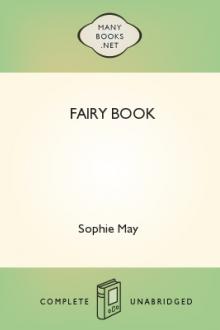The Roots of the Mountains<br />Wherein Is Told Somewhat of the Lives of the Men of Burgdale, Their by William Morris (best sales books of all time .txt) 📗

- Author: William Morris
Book online «The Roots of the Mountains<br />Wherein Is Told Somewhat of the Lives of the Men of Burgdale, Their by William Morris (best sales books of all time .txt) 📗». Author William Morris
She stood a while on the brink of the brook here, which was brim-full and nigh running into the grass, because there was a dam p. 278just below the place; and Folk-might drew nigher to her under cover of the thorn-bushes, and looked at the place about her and beyond her. The meadow beyond stream was very fair and flowery, but not right great; for it was bounded by a grove of ancient chestnut trees, that went on and on toward the southern cliffs of the Dale: in front of the chestnut wood stood a broken row of black-thorn bushes, now growing green and losing their blossom, and he could see betwixt them that there was a grassy bank running along, as if there had once been a turf-wall and ditch round about the chestnut trees. For indeed this was the old place of tryst between Gold-mane and the Bride, whereof the tale hath told before.
The Bride stayed scarce longer than gave him time to note all this; but he deemed that she was weeping, though he could not rightly see her face; for her shoulders heaved, and she hung her face adown and put up her hands to it. But now she went a little higher up the stream, where the water was shallower, and waded the stream and went up over the meadow, still weeping, as he deemed, and went between the black-thorn bushes, and sat her down on the grassy bank with her back to the chestnut trees.
Folk-might was ashamed to have seen her weeping, and was half-minded to turn him back again at once; but love constrained him, and he said to himself, ‘Where shall I see her again privily if I pass by this time and place?’ So he waited a little till he deemed she might have mastered the passion of tears, and then came forth from his bush, and went down to the water and crossed it, and went quietly over the meadow straight towards her. But he was not half-way across, when she lifted up her face from between her hands and beheld the man coming. She neither started nor rose up; but straightened herself as she sat, and looked right into Folk-might’s eyes as he drew near, though the tears were not dry on her cheeks.
Now he stood before her, and said: ‘Hail to the Daughter of a mighty House! Mayst thou live happy!’
p. 279She answered: ‘Hail to thee also, Guest of our Folk! Hast thou been wandering about our meadows, and happened on me perchance?’
‘Nay,’ he said; ‘I saw thee come forth from the House of the Steer, and I followed thee hither.’
She reddened a little, and knit her brow, and said:
‘Thou wilt have something to say to me?’
‘I have much to say to thee,’ he said; ‘yet it was sweet to me to behold thee, even if I might not speak with thee.’
She looked on him with her deep simple eyes, and neither reddened again, nor seemed wroth; then she said:
‘Speak what thou hast in thine heart, and I will hearken without anger whatsoever it may be; even if thou hast but to tell me of the passing folly of a mighty man, which in a month or two he will not remember for sorrow or for joy. Sit here beside me, and tell me thy thought.’
So he sat him adown and said: ‘Yea, I have much to say to thee, but it is hard to me to say it. But this I will say: to-day and yesterday make the third time I have seen thee. The first time thou wert happy and calm, and no shadow of trouble was on thee; the second time thine happy days were waning, though thou scarce knewest it; but to-day and yesterday thou art constrained by the bonds of grief, and wouldest loosen them if thou mightest.’
She said: ‘What meanest thou? How knowest thou this? How may a stranger partake in my joy and my sorrow?’
He said: ‘As for yesterday, all the people might see thy grief and know it. But when I beheld thee the first time, I saw thee that thou wert more fair and lovely than all other women; and when I was away from thee, the thought of thee and thine image were with me, and I might not put them away; and oft at such and such a time I wondered and said to myself, what is she doing now? though god wot I was dealing with tangles and troubles and rough deeds enough. But the second time I beheld thee, when I had looked to have great joy in the sight of thee, my heart was p. 280smitten with a pang of grief; for I saw thee hanging on the words and the looks of another man, who was light-minded toward thee, and that thou wert troubled with the anguish of doubt and fear. And he knew it not, nor saw it, though I saw it.’
Her face grew troubled, and the tearful passion stirred within her. But she held it aback, and said, as anyone might have said it:
‘How wert thou in the Dale, mighty man? We saw thee not.’
He said: ‘I came hither hidden in other semblance than mine own. But meddle not therewith; it availeth nought. Let me say this, and do thou hearken to it. I saw thee yesterday in the street, and thou wert as the ghost of thine old gladness; although belike thou hast striven with sorrow; for I see thee with a sword by thy side, and we have been told that thou, O fairest of women, hast given thyself to the Warrior to be his damsel.’
‘Yea,’ she said, ‘that is sooth.’
He went on: ‘But the face which thou bearedst yesterday against thy will, amidst all the people, that was because thou hadst seen my sister the Sun-beam for the first time, and Face-of-god with her, hand clinging to hand, lip longing for lip, desire unsatisfied, but glad with all hope.’
She laid hand upon hand in the lap of her gown, and looked down, and her voice trembled as she said:
‘Doth it avail to talk of this?’
He said: ‘I know not: it may avail; for I am grieved, and shall be whilst thou art grieved; and it is my wont to strive with my griefs till I amend them.’
She turned to him with kind eyes and said:
‘O mighty man, canst thou clear away the tangle which besetteth the soul of her whose hope hath bewrayed her? Canst thou make hope grow up in her heart? Friend, I will tell thee that when I wed, I shall wed for the sake of the kindred, hoping for no joy therein. Yea, or if by some chance the desire of man came again into my heart, I should strive with it to rid myself of it, for I should know of it that it was but a wasting folly, that p. 281should but beguile me, and wound me, and depart, leaving me empty of joy and heedless of life.’
He shook his head and said: ‘Even so thou deemest now; but one day it shall be otherwise. Or dost thou love thy sorrow? I tell thee, as it wears thee and wears thee, thou shalt hate it, and strive to shake it off.’
‘Nay, nay,’ she said; ‘I love it not; for not only it grieveth me, but also it beateth me down and belittleth me.’
‘Good is that,’ said he. ‘I know how strong thine heart is. Now, wilt thou take mine hand, which is verily the hand of thy friend, and remember what I have told thee of my grief which cannot be sundered from thine? Shall we not talk more concerning this? For surely I shall soon see thee again, and often; since the Warrior, who loveth me belike, leadeth thee into fellowship with me. Yea, I tell thee, O friend, that in that fellowship shalt thou find both the seed of hope, and the sun of desire that shall quicken it.’
Therewith he arose and stood before her, and held out to her his hand all hardened with the sword-hilt, and she took it, and stood up facing him, and said:
‘This much will I tell thee, O friend; that what I have said to thee this hour, I thought not to have said to any man; or to talk with a man of the grief that weareth me, or to suffer him to see my tears; and marvellous I deem it of thee, for all thy might, that thou hast drawn this speech from out of me, and left me neither angry nor ashamed, in spite of these tears; and thou whom I have known not, though thou knewest me!
‘But now it were best that thou depart, and get thee home to the House of the Face, where I was once so frequent; for I wot that thou hast much to do; and as thou sayest, it will be in warfare that I shall see thee. Now I thank thee for thy words and the thought thou hast had of me, and the pain which thou hast taken to heal my hurt: I thank thee, I thank thee, for as grievous as it is to show one’s hurts even to a friend.’
p. 282He said: ‘O Bride, I thank thee for hearkening to my tale; and one day shall I thank thee much more. Mayest thou fare well in the Field and amidst the Folk!’
Therewith he kissed her hand, and turned away, and went across the meadow and the stream, glad at heart and blithe with everyone; for kindness grew in him as gladness grew.
CHAPTER XXXVII. OF THE FOLK-MOTE OF THE DALESMEN, THE SHEPHERD-FOLK, AND THE WOODLAND CARLES: THE BANNER OF THE WOLF DISPLAYED.Now came the day of the Great Folk-mote, and there was much thronging from everywhere to the Mote-stead, but most from Burgstead itself, whereas few of the Dale-dwellers who had been at the Fair had gone back home. Albeit some of the Shepherds and of the Dalesmen of the westernmost Dale had brought light tents, and tilted themselves in in the night before the Mote down in the meadows below the Mote-stead. From early morning there had been a stream of folk on the Portway setting westward; and many came thus early that they might hold converse with friends and well-wishers; and some that they might disport them in the woods. Men went in no ordered bands, as the Burgstead men at least had done on the day of the Weapon-show, save that a few of them who were arrayed the bravest gathered about the banners, and went with them to the Mote-stead; for all the banners must needs be there.
The Folk-mote was to be hallowed-in three hours before noon, as all men knew; therefore an hour before that time were all men of the Dale and the Shepherds assembled that might be looked for, save the Alderman and the chieftains with the banner of the Burg, and these were not like to come many minutes before the Hallowing. Folk were gathered on the Field in such wise, that the men-at-arms made a great ring round about the Doom-ring, p. 283(albeit there were many old men there, girt with swords that they should never heave up again in battle), so that without that ring there was nought save women and children. But when all the other Houses were assembled, men looked around, and beheld the place of the Woodlanders that it was empty; and they marvelled that they were thus belated. For now all was ready, and a watcher had gone up to the Tower on the height, and had with him the great Horn of Warning, which could be heard past the Mote-stead and a great way down the Dale: and if he saw foes coming from the East he should blow one blast; if from the South, two; if from the West, three; if from the North, four.
So half an hour from the appointed time of Hallowing rose the rumour that the Alderman was on the road, and presently they of the women who were on the outside of the throng, by drawing nigh to the edge of the sheer rock, could behold the Banner of the Burg on the Portway, and soon after could see the wain, done about with green boughs, wherein sat the chieftains in their glittering war-gear. Speedily they spread the tidings, and a confused shout went up into the air; and in a little while the wain stayed on Wildlake’s Way at the bottom of the steep slope that went up to the Mote-stead, and the banner of





Comments (0)